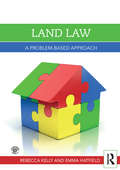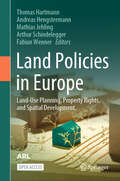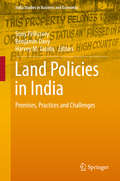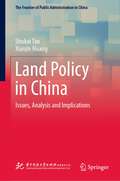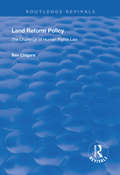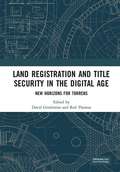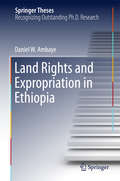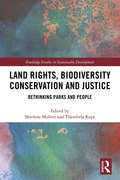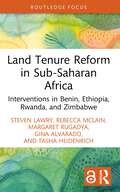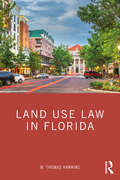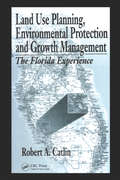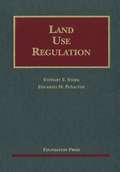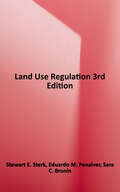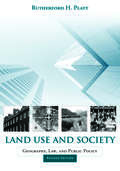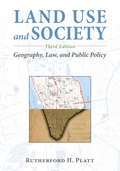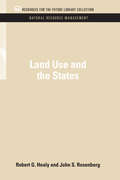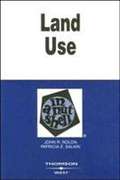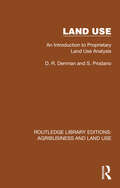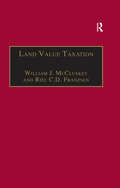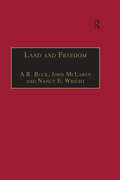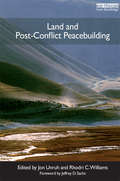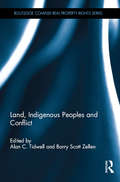- Table View
- List View
Land Law: A Problem-Based Approach (Problem Based Learning)
by Rebecca Kelly Emma HatfieldLand Law: A Problem-Based Approach creates a fresh approach to learning land law through the use of real-life scenarios which bring what is often perceived to be a dry and difficult subject to life. This helps both to engage the student and make the subject more accessible as well as placing land law in it's real world context. With Land Law: A Problem-Based Approach, context is placed at the heart of learning and guides students through application rather than via an abstract set of rules and can therefore gain a deeper understanding of how land law works, not just what it is. This new textbook creates a fresh approach to learning land law through the use of scenarios found in real-life which bring what is often perceived to be a dry and difficult subject to life. This helps both to engage the student and make the subject more accessible as well as demonstrating to students how land law actually operates in the real world. Land Law is often seen as an esoteric subject with lots of technicalities and complex vocabulary and students often forget the context in which it operates. With Land Law: A Problem-Based Approach, context is placed at the heart of learning. Students are learning through application rather than via an abstract set of rules and can therefore gain a deeper understanding of how land law works, not just what it is. Unlike other textbooks, Land Law: A Problem-Based Approach integrates a thorough exposition of the law with practice, facilitating a more active learning approach and helping students to engage directly with the key cases and statutes to develop key skills of analysis, problem-solving and application. Written in a clear and concise style but without sacrificing detail or analysis, the book guides the reader towards a deeper understanding of the land law curriculum. Key features include: An introductory chapter outlining the problem-based learning approach and how to use the book. Content overviews at the start of each chapter which provide a useful outline of the chapter s content and the key principles PBL scenarios at the start of each chapter which provide the real-life context to each topic and help to familiarise readers with the legal language and style they will encounter. Together with the relevant supporting documents, these scenarios are referenced and integrated throughout the chapter let s put this into context boxes which require students to apply the law that they have learnt back to the problem scenario and offer opportunites to reflect and consolidate on the content covered Essential Cases and Esential Statutes boxes reinforce the essential role of cases and legislation in the development and application of land law and help students identify key cases and legislation for revision purposes Understanding Terminology boxes and an online glossary help students to get to grips with the technical terms and vocabulary unique to land law Tables and diagrams explain difficult concepts and rules, ideal for visual learners Tips and notes highlight key issues and make links between different aspects of the law without interrupting the flow of the text. Specimen exam-style questions are ideal for revision and help to provide opportunities to apply learning and practice exam technique"
Land Policies in Europe: Land-Use Planning, Property Rights, and Spatial Development
by Thomas Hartmann Andreas Hengstermann Mathias Jehling Arthur Schindelegger Fabian WennerLand is a scarce resource. How can conflicting claims to land be reconciled? How can more housing be provided and, at the same time, the ecological goal of reducing land take be met? In many European countries, land-use planning is facing increasing and oftentimes contradictory challenges. This forms a land question, which requires land policies that can deal with the fraught relationship between planning and private property rights. A legislativereflex is to adapt planning laws. Oftentimes, such changes lack a deeper reflection of land policy and its implications. Especially an international comparison can foster a structured reflection of the own land policy.This thought-provoking book compiles a remarkable collection of 12 cases unveiling how land policies work. Curated by leading experts in the field, it takes the reader on a journey through the multifaceted realm of land policies across the continent. This book offers valuable insights into the complex interplay between land use, and property rights. "Land Policies in Europe" isn't just a book; it's a conversation starter equally relevant for experienced academics or young students, policymakers, and practitioners. This is an open access book.
Land Policies in India: Promises, Practices and Challenges (India Studies in Business and Economics)
by Sony Pellissery Benjamin Davy Harvey M. JacobsThis book examines how property rights are linked to socio-economic progress and development. It also provides a theoretical analysis, an economic/social analysis of planning, case studies of the implementation of planning and regulation instruments, practices related to law and planning, analysis of case laws in a particular segment. The interconnection between property, law and planning is a running theme throughout the book. The land question has been central to South Asian development on two counts: First, although the majority of the population relies on agriculture and allied activities their livelihood, landholding is highly skewed; second, urban planning is facing unprecedented challenges due to bourgeoning property values as well as gush of migrants to cities seeking livelihood. The response to these challenges in the form of laws and policies has been very large compared to the academic attention that is received. However, the measures emerging from planning and policies have had limited impact on the extent of the problems. This paradox calls for serious introspection and academic engagement that this book undertakes. The book further deals with the emerging discipline of planning law, which determines property value and use, and argues that regulatory issues of public policy determine the property valuation and property pricing.
Land Policy in China: Issues, Analysis and Implications (The Frontier of Public Administration in China)
by Shukui Tan Xianjin HuangThis book shows the most recent changes in China’s land policy and the progress in land policy studies in terms of theory and cases. It provides an up-to-date introduction to specific land policies implemented in China, as well as an in-depth analysis of the positioning and mechanisms of these policies. It is divided into four parts with seven chapters consisting of a) introduction to land and land policy, b) overview of China’s land policy, c) typical policy issues in specific fields including land tenure, development, protection, and administration, and d) outlook of China’s land policy. With its emphasis on the importance of practice, this book not only provides readers with tools for a systematic understanding of China’s land policy practices, but also sheds light on relevant policy formulation and practice in other countries.
Land Reform Policy: The Challenge of Human Rights Law (Routledge Revivals)
by Ben ChigaraOriginally published in 2004. The book examines the possibility of resolving past and continuing social injustices that are rooted in colonial or some such other similar experience of states from a variety of perspectives. First the issue is examined from an international law perspective, which evaluates the validity of counter claims to title to land in affected SADC states. Secondly the issue is examined from a human rights perspective, which privileges promotion for the respect of the inherent dignity of all persons. Thirdly, the issue is examined from victimology and psychology schools of thought in order to understand both the effect and impact on stakeholders of the operative dynamics in conflicts that arise from long standing social injustices that are connected to colonial or some such other similar historical experience of States. The book proposes humwefficiency as a model for resolution of this type of conflict. This model targets preservation of the inherent dignity of all stakeholders by combining international human rights morality with local intuition about land ownership and use. In this sense, the book takes human rights theory beyond politics and utopia, and applies it to foster new social engineering technologies for the resolution of social injustices and promotion of social justice. This is justified by the fact that the human rights culture has evolved in a considerably short period of time to become the dominant culture of the world.
Land Registration and Title Security in the Digital Age: New Horizons for Torrens
by David Grinlinton Rod ThomasThis book examines the current state of, and emerging issues in relation to, the Torrens and other systems of land registration, and the process of automation of land registration systems in jurisdictions where this is occurring worldwide. It analyses the impacts of advances in digital technology in this area and includes contributions from of a number of experts and leaders in this subject from a number of jurisdictions. While it has an Australasian bias, there are important chapters outlining current challenges and developments in Scotland, England and Wales, Ireland, and the Netherlands. The book will be relevant to those engaged in land registration and conveyancing processes, including, but not limited to, property law practitioners and conveyancers, academics in this field, government and public policy experts, law and property students, and IT and IP experts, especially those working on developing automated land registration systems.
Land Revenue Code, 1968 and Rules.
by The Government of GoaThis book is from Government of goa about land renvenue code 1968 and Rules.
Land Rights and Expropriation in Ethiopia
by Daniel W. AmbayeThis thesis provides a new approach to the Ethiopian Land Law debate. The basic argument made in this thesis is that even if the Ethiopian Constitution provides and guarantees common ownership of land (together with the state) to the people, this right has not been fully realized whether in terms of land accessibility, enjoyability, and payment of fair compensation in the event of expropriation. Expropriation is an inherent power of the state to acquire land for public purpose activities. It is an important development tool in a country such as Ethiopia where expropriation remains the only method to acquire land. Furthermore, the two preconditions of payment of fair compensation and existence of public purpose justifications are not strictly followed in Ethiopia. The state remains the sole beneficiary of the process by capturing the full profit of land value, while paying inadequate compensation to those who cede their land by expropriation. Secondly, the broader public purpose power of the state in expropriating the land for unlimited activities puts the property owners under imminent risk of expropriation.
Land Rights, Biodiversity Conservation and Justice: Rethinking Parks and People (Routledge Studies in Sustainable Development)
by Sharlene Mollett Thembela KepeIn the context of sustainable development, recent land debates tend to construct two porous camps. On the one side, norms of land justice and their advocates dictate that people’s rights to tenure security are tantamount and even sometimes key to successful conservation practice. On the other hand, biodiversity protection and conservation advocates, supported by global environmental organizations and states, remain committed to conservation strategies, steeped in genetics and biological sciences, working on behalf of a "global" mandate for biodiversity and climate change mitigation. Land Rights, Biodiversity Conservation and Justice seeks to illuminate struggles for land and territory in the context of biodiversity conservation. This edited volume explores the particular ideologies, narratives and practices that are mobilized when the agendas of biodiversity conservation practice meet, clash, and blend with the demands for land and access and control of resources from people living in, and in close proximity to, parks. The book maintains that, while biodiversity conservation is an important goal in a time where climate change is a real threat to human existence, the successful and just future of biodiversity conservation is contingent upon land tenure security for local people. The original research gathered together in this volume will be of considerable interest to researchers of development studies, political ecology, land rights, and conservation.
Land Tenure Reform in Sub-Saharan Africa: Interventions in Benin, Ethiopia, Rwanda, and Zimbabwe (Routledge Focus on Environment and Sustainability)
by Steven Lawry Rebecca McLain Margaret Rugadya Gina Alvarado Tasha HeidenrichThis book examines the impacts of land tenure reform interventions implemented in Benin, Ethiopia, Rwanda, and Zimbabwe. Since 2000, many African countries have introduced programs aimed at providing smallholder farmers with low-cost certificates for land held under customary tenure. Yet there are many contending views and debates on the impact of these land policies and this book reveals how tenure security, agricultural productivity, and social inclusion were affected by the interventions. It analyses the results of carefully selected, authoritative studies on interventions in Benin, Ethiopia, Rwanda, and Zimbabwe and applies a realist synthesis methodology to explore the socio-political and economic contexts. Drawing on these results, the book argues that inadequate attention paid to the core characteristics of rural social systems obscures the benefits of customary tenure while overlooking the scope for reforms to reduce the gaps in social status among members of customary communities. This book will be of great interest to students and scholars of land management and use, land and property law, tenure security, agrarian studies, political economy, and sustainable development. It will also appeal to development professionals and policymakers involved in land governance and land policy in Africa.
Land Use Law and Disability
by Robin Paul MalloyIn Land Use Law and Disability, Robin Paul Malloy argues that our communities need better planning to be safely and easily navigated by people with mobility impairment and to facilitate intergenerational aging in place. To achieve this, communities will need to think of mobility impairment and inclusive design as land use and planning issues, in addition to understanding them as matters of civil and constitutional rights. Although much has been written about the rights of people with disabilities, little has been said about the interplay between disability and land use regulation. This book undertakes to explain mobility impairment, as one type of disability, in terms of planning and zoning. The goal is to advance our understanding of disability in terms of planning and zoning to facilitate cooperative engagement between disability rights advocates and land use professionals. This in turn should lead to improved community planning for accessibility and aging in place.
Land Use Law in Florida
by W. Thomas HawkinsLand Use Law in Florida presents an in-depth analysis of land use law common to many states across the United States, using Florida cases and statutes as examples. Florida case law is an important course of study for planners, as the state has its own legal framework that governs how people may use land, with regulation that has evolved to include state-directed urban and regional planning. The book addresses issues in a case format, including planning, land development regulation, property rights, real estate development and land use, transportation, and environmental regulation. Each chapter summarizes the rules that a reader should draw from the cases, making it useful as a reference for practicing professionals and as a teaching tool for planning students who do not have experience in reading law. This text is invaluable for attorneys; professional planners; environmental, property rights, and neighborhood activists; and local government employees who need to understand the rules that govern how property owners may use land in Florida and around the country.
Land Use Planning, Environmental Protection and Growth Management: The Florida Experience
by Robert A CatlinThis book examines the history and impact of Florida's Comprehensive Planning legislation. Topics include coastal zone management, solid waste planning, land use impacts, planning strategies, and more.
Land Use Regulation
by Eduardo M. Penalver Stewart E. SterkThis casebook offers a concise, user-friendly presentation of land use law. Written with an eye toward simulating the sorts of land-use issues that students will face as lawyers working for developers, planners or environmental advocates, it incorporates a focus on practice throughout. In addition, the casebook devotes an entire chapter to complex and realistic scenarios that provide students an opportunity to bring to bear what they have learned throughout the semester to solve challenging legal and strategic problems.
Land Use Regulation (University Casebook Series)
by Eduardo M. Penalver Stewart E. Sterk Sara C. BroninThis casebook offers a concise, user-friendly presentation of land use law that incorporates a focus on critical thinking and practice throughout. It devotes an entire chapter to complex and realistic scenarios that provide students with an opportunity to apply what they have learned throughout the semester to solve challenging legal and strategic problems. New materials in the third edition ensure that students will become familiar with the latest trends in land use law.
Land Use and Society, Revised Edition: Geography, Law, and Public Policy
by Rutherford H. PlattLand Use and Society is a unique and compelling exploration of interactions among law, geography, history, and culture and their joint influence on the evolution of land use and urban form in the United States. Originally published in 1996, this completely revised, expanded, and updated edition retains the strengths of the earlier version while introducing a host of new topics and insights on the twenty-first century metropolis. This new edition of Land Use and Society devotes greater attention to urban land use and related social issues with two new chapters tracing American city and metropolitan change over the twentieth century. More emphasis is given to social justice and the environmental movement and their respective roles in shaping land use and policy in recent decades. This edition of Land Use and Society by Rutherford H. Platt is updated to reflect the 2000 Census, the most recent Supreme Court decisions, and various topics of current interest such as affordable housing, protecting urban water supplies, urban biodiversity, and "ecological cities." It also includes an updated conclusion that summarizes some positive and negative outcomes of urban land policies to date.
Land Use and Society: Geography, Law, and Public Policy
by Rutherford H. PlattThe intersection between geography and law is a critical yet often overlooked element of land-use decisions, with a widespread impact on how societies use the land, water, and biodiversity around them. Land Use and Society, Third Edition is a clear and compelling guide to the role of law in shaping patterns of land use and environmental management. Originally published in 1996 and revised in 2004, this third edition has been updated with data from the 2010 U. S. Census and revised with the input of academics and professors to address the changing issues in land use, policy, and law today. Land Use and Society, Third Edition retains the historical approach of the original text while providing a more concise and topical survey of the evolution of urban land use regulation, from Europe in the Middle Ages through the present day United States. Rutherford Platt examines the "nuts and bolts" of land use decision-making in the present day and analyzes key players, including private landowners, local and national governments, and the courts. This third edition is enhanced by a discussion of the current trends and issues in land use, from urban renewal and demographic shifts in cities to the growing influence of local governance in land use management. Land Use and Society, Third Edition is a vital resource for any student seeking to understand the intersection between law, politics, and the natural world. While Platt examines specific rules, doctrines, and practices from an American context, an understanding of the role of law in shaping land use decisions will prove vital for students, policymakers, and land use managers around the world.
Land Use and the States (RFF Natural Resource Management Set)
by Robert G. Healy John S. RosenbergAn enlarged and revised book which looks at some programs of state land use control. Focusing on the problems that have caused the public to demand such controls, on the variety of legislative responses, and on the problems of implementation that arise, this study presents a rationale for the role of the state government in the land use field. Originally published in 1979
Land Use in a Nutshell
by John R. Nolon Patricia E. SalkinLand Use in a Nutshell is not a stand-alone book but rather an invaluable companion to the casebooks, articles and ongoing discussions in the United States and throughout the world about this thing called land.
Land Use: An Introduction to Proprietary Land Use Analysis (Routledge Library Editions: Agribusiness and Land Use #2)
by D. R. Denman S. ProdanoOriginally published in 1972, this work shed new light on the study of land use. The key to the analysis was the proprietary land unit, within which all positive decisions touching land use are made. The analysis has a universal relevance, irrespective of social order, economic philosophy and judicial systems. The work will be of interest to lawyers, economists, agriculturalists, town and country planners and those in central and local government.
Land Value Taxation: An Applied Analysis
by William J. McCluskey Riël C.D. FranzsenThis study of the strategic, policy and operational characteristics of Land Value Taxation is a unique and original contribution to Elston knowledge. McCluskey and Franzsen provide a clear and detailed synthesis of existing Land Value Taxation systems and address the perceived advantages and disadvantages of such systems. The implications of this work, based on a two-tier analysis of selected countries, will be critical in terms of informing policy makers when contemplating reviews of existing Land Value Taxation systems or its possible introduction. The empirical research underpinning this work has attempted to concisely provide the role of land value systems within the selected case study countries. The work has clearly identified a number of challenges being faced by those countries and jurisdictions that currently utilise land value tax systems. Given these challenges this book is timely in that it provides detailed expositions of property tax systems that are undergoing significant change and reform.
Land and Freedom: Law, Property Rights and the British Diaspora
by John McLaren Andrew Buck Nancy WrightConflicts caused by competing concepts of property are the subject of this book that reshapes study of the relationship between law and society in Australasia and North America. Chapters analyse decisions made by governments and courts upon questions of policy and law in terms of their consequences for rights and models of personhood. Late twentieth-century decisions concerning native title in Canada and Australia demonstrate the relevance of historical case studies of communal and fee-simple land holding in colonial and post-colonial societies. An international team of contributors draw on their experience from a wide range of disciplinary backgrounds and jurisdictions.
Land and Post-Conflict Peacebuilding (Post-Conflict Peacebuilding and Natural Resource Management)
by Jon Unruh Rhodri C. WilliamsClaims to land and territory are often a cause of conflict, and land issues present some of the most contentious problems for post-conflict peacebuilding. Among the land-related problems that emerge during and after conflict are the exploitation of land-based resources in the absence of authority, the disintegration of property rights and institutions, the territorial effect of battlefield gains and losses, and population displacement. In the wake of violent conflict, reconstitution of a viable land-rights system is crucial: an effective post-conflict land policy can foster economic recovery, help restore the rule of law, and strengthen political stability. But the reestablishment of land ownership, land use, and access rights for individuals and communities is often complicated and problematic, and poor land policies can lead to renewed tensions. In twenty-one chapters by twenty-five authors, this book considers experiences with, and approaches to, post-conflict land issues in seventeen countries and in varied social and geographic settings. Highlighting key concepts that are important for understanding how to address land rights in the wake of armed conflict, the book provides a theoretical and practical framework for policy makers, researchers, practitioners, and students. Land and Post-Conflict Peacebuilding is part of a global initiative to identify and analyze lessons in post-conflict peacebuilding and natural resource management. The project has generated six edited books of case studies and analyses, with contributions from practitioners, policy makers, and researchers. Other books in the series address high-value resources, water, livelihoods, assessing and restoring resources, and governance.
Land and Privilege in Byzantium
by Mark C. BartusisA pronoia was a type of conditional grant from the emperor, often to soldiers, of various properties and privileges. In large measure the institution of pronoia characterized social and economic relations in later Byzantium, and its study is the study of later Byzantium. Filling the need for a comprehensive study of the institution, this book examines the origin, evolution and characteristics of pronoia, focusing particularly on the later thirteenth and fourteenth centuries. But the book is much more than a study of a single institution. With a broad chronological scope extending from the mid-tenth to the mid-fifteenth century, it incorporates the latest understanding of Byzantine agrarian relations, taxation, administration and the economy, as it deals with relations between the emperor, monastic and lay landholders, including soldiers and peasants. Particular attention is paid to the relation between the pronoia and Western European, Slavic and Middle Eastern institutions, especially the Ottoman timar.
Land, Indigenous Peoples and Conflict (Routledge Complex Real Property Rights Series)
by Barry Scott Zellen Alan C. TidwellLand, Indigenous Peoples and Conflict presents an original comparative study of indigenous land and property rights worldwide. The book explores how the ongoing constitutional, legal and political integration of indigenous peoples into contemporary society has impacted on indigenous institutions and structures for managing land and property. This book details some of the common problems experienced by indigenous peoples throughout the world, providing lessons and insights from conflict resolution that may find application in other conflicts including inter-state and civil and sectarian conflicts. An interdisciplinary group of contributors present specific case material from indigenous land conflicts from the South Pacific, Australasia, South East Asia, Africa, North and South America, and northern Eurasia. These regional cases discuss issues such as modernization, the evolution of systems and institutions regulating land use, access and management, and the resolution of indigenous land conflicts, drawing out common problems and solutions. The lessons learnt from the book will be of value to students, researchers, legal professionals and policy makers with an interest in land and property rights worldwide.
